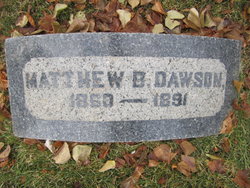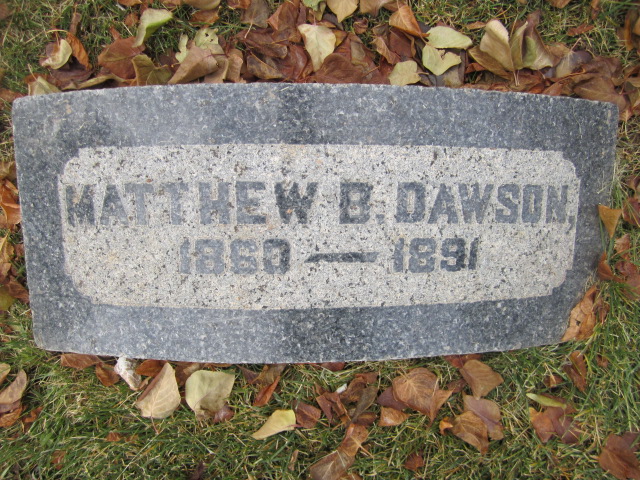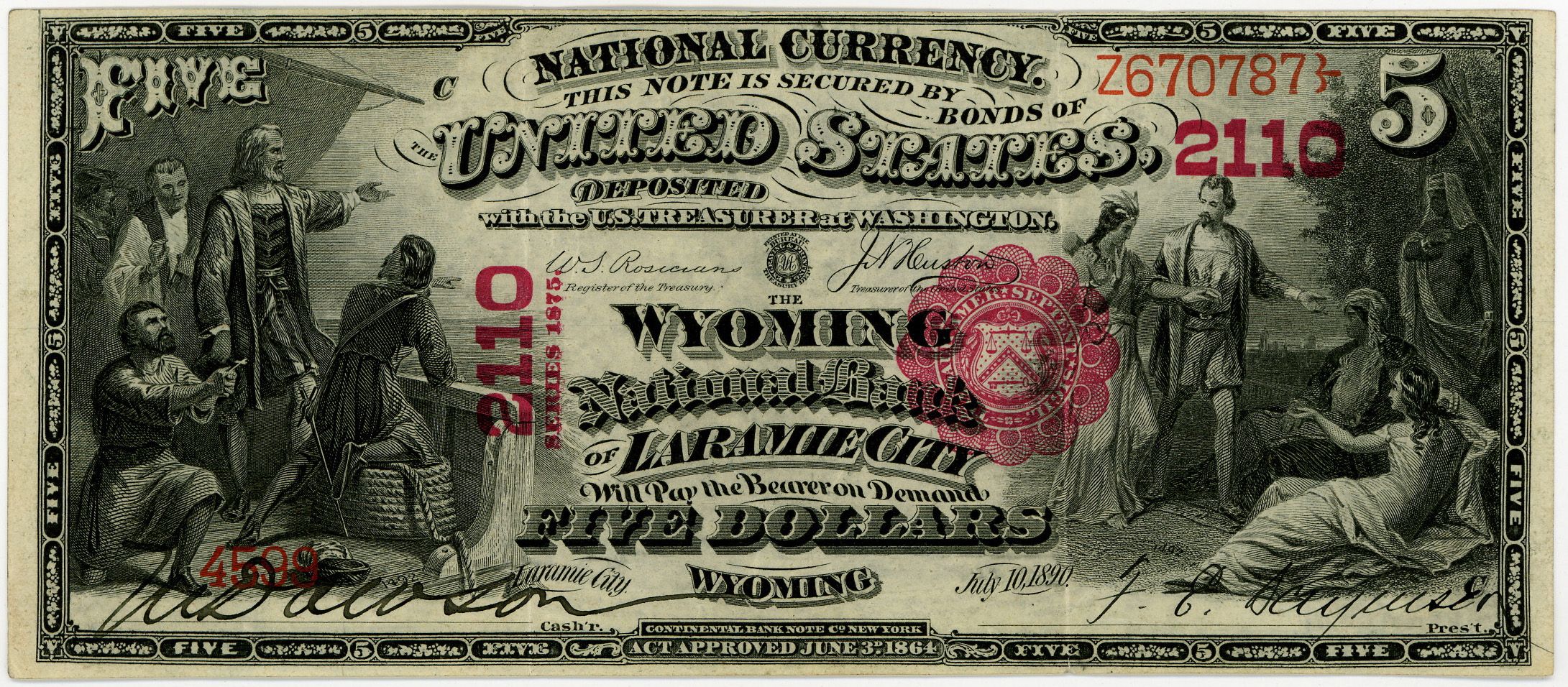The news was not brought to town until after 10 p.m. Between that hour and midnight a score of outfits left for the lake, and not only every available rig in the livery stables was called into requisition, but many private ones besides.
The story at first circulated among a few seemed incredible. It proved in the end only too true. On Thursday of last week The Boomerang contained an account of the arrival of two eighteen-foot Clinker sail boats, built by John Guenster, formerly of this city but now a resident of Jamestown, New York.
When they were received the fascination of boating in Wyoming and especially on some of the beautiful lakes surrounding Laramie, was talked of generally by people who appreciate outdoor amusements and are familiar with the charms of our lakes and streams, and it was thought that other purchases of like character would follow. The sail event of yesterday will however, likely put an end to aquatic sports for a long lime to come.
At 8:30 o'clock Messrs. Scrymser, Dawson, George Stirling and James Davis started out in a mountain wagon, drawn by a small bay team, for the lakes. They reached their destination at 10:30 and were followed half an hour later by one of E.P. Kelly's express teams with the boats, sails and other camp equipage.
It is a singular fact that at least half a dozen parties who saw the outfit leave town remarked upon the danger that awaited the members and predicted a repetition of the Dunbar drowning that occurred back in the '70s.
Stirling and Davis went out to build a boat house and began their work on the north side of the lake. Scrymser and Dawson, having launched their little bark, took a sail and returned at noon, when they took lunch and about 1 o'clock started for a second time.
This was the last ever seen of them alive.
Stirling and Davis worked on until after 5 o'clock, when the latter, who seemed to have a premonition of evil, spoke of the prolonged absence of the two friends. Then they knocked off work and began to look around for the boat.
They walked clear around the south end of the lake to the east side before making any discovery of importance. There, within eighteen feet of the beach and beneath the shadow of a small bluff, they saw the upturned keel of the ill-fated yacht, and close by it an object which looked like either a body or a heavy overcoat resting on the water.
The dusk had been coming on rapidly, the gale that had swept over the plains all day long was dying down and as the darkness deepened it was impossible to distinguish objects even a few feet away.
To add to the bewilderment of the searchers, it was found that the team, which had been picketed near the shore, had broken loose. One horse escaped entirely. The other was caught not far away but was allowed to go and both animals found their way back to the city.
Stirling, appalled by the apparent disaster, and anxious to get help as quickly as possible, left on foot at once for town. He had a long and lonesome walk before him, over hill and dale, the pale light of the moon and stars to guide him and the awful knowledge of the tragedy that be was bearing with him to make the journey horrible.
It was a little after 10 when he got to town and told his story, which at first seemed to the few who were up to hear it beyond belief. But the alarm spread quickly and it was not long until a regular procession of vehicles was rushing out of the city, down past old Fort Sanders and out through the long lane that leads to the lakes.
State Treasurer Gramm, Chief Justice Groesbeck, Hon. Louis Miller, Sheriff Yund, Deputy Sheriff McKay Hon. M.N. Grant and other prominent citizens and officials were among those who went on the sad errand.
Three miles this side of the lake a party was met returning. "You need go no further," they said. 'It is all too true. They are dead.'' The party went on, nevertheless, and crossing a little divide saw the lake spread out before them.
In the cold, gray light of the moon, on the colder sand, from which the waves had but a few hours before receded, lay the white sail. It was folded over a body, and the frost bedecked it with diamonds. Tender hands turned back the folds and there lay the body of Fred Scrymser. The ice was not colder than that face and form that have been so familiar on our streets. The warmth of life was gone. The heart that was so loyal and true was still. After a little while the body was lifted and placed in a conveyance to be brought home.
Before his hands were crossed upon his breast, Mr. Scrymser's watch was taken from his pocket and an examination of the dial showed the time recorded to be 1:25. From this it would seem that the yacht capsized less than half an hour after the party lunched
and the two men started out for their second sail.
Scrymser's body was undoubtedly the object discovered by Geo. Stirling in the dusk of the evening. It had been caught in the sail and the ropes were wrapped around it, so that when the mast unshipped it was floated ashore. His hat and pipe were found close by him. Dawson was lost in the depths of the lake. His cigar case floated ashore, but beyond that no trace of him was to be discovered, and it was considered useless to search further until daylight.
Some of the watchers returned to the city; others remained until this morning, when it was believed the missing body would be found.The news of the terrible catastrophe was taken to Mrs. Dawson only when it seemed that doubt was no longer possible. She was completely prostrated by the blow, yet bore her grief with wonderful heroism.
A greater calamity could scarcely have happened the city than the loss at once of Fred E. Scrymser and Matt Dawson, two of the most public spirited, genial, honorable and whole souled men that have ever dwelt in our midst.
At this moment it is impossible to give even a brief sketch of their lives that would be accurate.
Mr. Dawson came to Laramie in 1882 from Woodstock, Canada, and has been a prominent figure in business circles ever since. He was cashier of the Wyoming National under Mr. E. Ivinson's administration and continued in the same position when Mr. Scrymser took charge. He leaves a wife, the sister of Mrs. Judge M.C. Brown, and one child. Everybody admired and loved this man for his many sterling qualities.
Excerpts from © Saturday Boomerang no. 49 October 17, 1891
Matthew Dawson was recovered from the lake on March 27, 1892.
The news was not brought to town until after 10 p.m. Between that hour and midnight a score of outfits left for the lake, and not only every available rig in the livery stables was called into requisition, but many private ones besides.
The story at first circulated among a few seemed incredible. It proved in the end only too true. On Thursday of last week The Boomerang contained an account of the arrival of two eighteen-foot Clinker sail boats, built by John Guenster, formerly of this city but now a resident of Jamestown, New York.
When they were received the fascination of boating in Wyoming and especially on some of the beautiful lakes surrounding Laramie, was talked of generally by people who appreciate outdoor amusements and are familiar with the charms of our lakes and streams, and it was thought that other purchases of like character would follow. The sail event of yesterday will however, likely put an end to aquatic sports for a long lime to come.
At 8:30 o'clock Messrs. Scrymser, Dawson, George Stirling and James Davis started out in a mountain wagon, drawn by a small bay team, for the lakes. They reached their destination at 10:30 and were followed half an hour later by one of E.P. Kelly's express teams with the boats, sails and other camp equipage.
It is a singular fact that at least half a dozen parties who saw the outfit leave town remarked upon the danger that awaited the members and predicted a repetition of the Dunbar drowning that occurred back in the '70s.
Stirling and Davis went out to build a boat house and began their work on the north side of the lake. Scrymser and Dawson, having launched their little bark, took a sail and returned at noon, when they took lunch and about 1 o'clock started for a second time.
This was the last ever seen of them alive.
Stirling and Davis worked on until after 5 o'clock, when the latter, who seemed to have a premonition of evil, spoke of the prolonged absence of the two friends. Then they knocked off work and began to look around for the boat.
They walked clear around the south end of the lake to the east side before making any discovery of importance. There, within eighteen feet of the beach and beneath the shadow of a small bluff, they saw the upturned keel of the ill-fated yacht, and close by it an object which looked like either a body or a heavy overcoat resting on the water.
The dusk had been coming on rapidly, the gale that had swept over the plains all day long was dying down and as the darkness deepened it was impossible to distinguish objects even a few feet away.
To add to the bewilderment of the searchers, it was found that the team, which had been picketed near the shore, had broken loose. One horse escaped entirely. The other was caught not far away but was allowed to go and both animals found their way back to the city.
Stirling, appalled by the apparent disaster, and anxious to get help as quickly as possible, left on foot at once for town. He had a long and lonesome walk before him, over hill and dale, the pale light of the moon and stars to guide him and the awful knowledge of the tragedy that be was bearing with him to make the journey horrible.
It was a little after 10 when he got to town and told his story, which at first seemed to the few who were up to hear it beyond belief. But the alarm spread quickly and it was not long until a regular procession of vehicles was rushing out of the city, down past old Fort Sanders and out through the long lane that leads to the lakes.
State Treasurer Gramm, Chief Justice Groesbeck, Hon. Louis Miller, Sheriff Yund, Deputy Sheriff McKay Hon. M.N. Grant and other prominent citizens and officials were among those who went on the sad errand.
Three miles this side of the lake a party was met returning. "You need go no further," they said. 'It is all too true. They are dead.'' The party went on, nevertheless, and crossing a little divide saw the lake spread out before them.
In the cold, gray light of the moon, on the colder sand, from which the waves had but a few hours before receded, lay the white sail. It was folded over a body, and the frost bedecked it with diamonds. Tender hands turned back the folds and there lay the body of Fred Scrymser. The ice was not colder than that face and form that have been so familiar on our streets. The warmth of life was gone. The heart that was so loyal and true was still. After a little while the body was lifted and placed in a conveyance to be brought home.
Before his hands were crossed upon his breast, Mr. Scrymser's watch was taken from his pocket and an examination of the dial showed the time recorded to be 1:25. From this it would seem that the yacht capsized less than half an hour after the party lunched
and the two men started out for their second sail.
Scrymser's body was undoubtedly the object discovered by Geo. Stirling in the dusk of the evening. It had been caught in the sail and the ropes were wrapped around it, so that when the mast unshipped it was floated ashore. His hat and pipe were found close by him. Dawson was lost in the depths of the lake. His cigar case floated ashore, but beyond that no trace of him was to be discovered, and it was considered useless to search further until daylight.
Some of the watchers returned to the city; others remained until this morning, when it was believed the missing body would be found.The news of the terrible catastrophe was taken to Mrs. Dawson only when it seemed that doubt was no longer possible. She was completely prostrated by the blow, yet bore her grief with wonderful heroism.
A greater calamity could scarcely have happened the city than the loss at once of Fred E. Scrymser and Matt Dawson, two of the most public spirited, genial, honorable and whole souled men that have ever dwelt in our midst.
At this moment it is impossible to give even a brief sketch of their lives that would be accurate.
Mr. Dawson came to Laramie in 1882 from Woodstock, Canada, and has been a prominent figure in business circles ever since. He was cashier of the Wyoming National under Mr. E. Ivinson's administration and continued in the same position when Mr. Scrymser took charge. He leaves a wife, the sister of Mrs. Judge M.C. Brown, and one child. Everybody admired and loved this man for his many sterling qualities.
Excerpts from © Saturday Boomerang no. 49 October 17, 1891
Matthew Dawson was recovered from the lake on March 27, 1892.
Advertisement
Explore more
Sponsored by Ancestry
Advertisement



